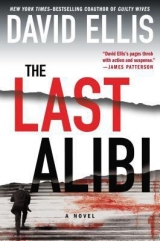
Текст книги "The Last Alibi"
Автор книги: David Ellis
Жанры:
Триллеры
,сообщить о нарушении
Текущая страница: 29 (всего у книги 31 страниц)
107.
Jason
9:50 P.M.
I drive slowly, minding the speed limit, gripping the steering wheel with trembling hands, still short on every detail, but the memories coming back. I remember Marshall was violent, sexually violent toward women. I remember a young woman with a baby. Not her name, not every single feature by any means, but I remember a teenage mother. Mexican. Long, kinky black hair, I remember that. An infant in her arms, maybe six months old, not something I’d be in a position to estimate back then. She probably told me the baby’s name, age, gender, but I don’t remember any of that now.
But I remember she was terrified. I remember that I couldn’t use her. If I was going to nail Marshall Rivers, I’d have to come up with something else.
Get me a confession, said Patrick Romer back then. Get me a confession and we’ll prosecute.
And I did.
I park my car on the 2400 block of West Hampton. Lightner had said 2538 Hampton, and there isn’t a 2500 block east—it would be three miles into the lake. So he must have meant 2538 West Hampton. It makes sense, too, this southwest-side neighborhood being the home of an ex-con with minimal job prospects, probably not much money. The area has been completely ravaged by the housing crisis; what was, fifteen years ago, a promising neighborhood has been ransacked by foreclosures and is now riddled with drugs and crime, gang wars and prostitution, con artists and homelessness.
This time of night, in a hood like this, the only people who are walking the streets are looking for trouble. I guess I’m one of them. Yes, in part, I’m here because of Alexa. I left the Taser there, she said to me. I forgot all about it when I was done. Her fingerprints could be on the weapon. She couldn’t very well wear gloves, not in the middle of this blazing heat. Alexa was smart, knocking on Marshall’s door, dressed provocatively, knowing that prostitutes occasionally go door-to-door in the seamier neighborhoods—but no matter how much she looked the part, Marshall’s radar would have tuned up loudly if she were wearing gloves.
I reach the apartment complex, 2538 West Hampton. It’s a brick three-flat, not long ago probably a nice place to live, owned by people with high hopes, sold unrealistic mortgages that put them under water. Now it’s a rental building, probably still owned by the bank. Apartment 1 is the garden apartment, five steps below ground. There is a small cast-iron gate without a lock. From the sidewalk, I take one look around me, trying not to look too suspicious in doing so, and cast my eyes upward at the other apartments. No sign that anyone’s looking out, no blinds pinched or curtains folded back.
Then I stroll through the gate, covering my hand with my shirt, and walk down to apartment 1 as if I don’t have a care in the world. Alexa said the door would be open, she didn’t lock it behind her. It could have a lock on the doorknob that will keep me out. But it doesn’t. I turn the knob with my shirt again and take a breath.
Don’t touch anything, Alexa pleaded with me. Please don’t touch anything.
The door opens. I walk in and close the door before I do anything else. Then I turn. It’s a studio apartment, very small, just one large room with a small kitchenette, a round table for eating, and then a bathroom to the side. There are two pieces of furniture besides the dining table: a small wooden table on which a computer rests, and a dingy yellow couch.
Marshall Rivers is against the couch, tipped over on his right side, his legs splayed out perpendicular to his body. Alexa said she Tasered him and dragged him over by the couch, where she slit his wrists. It looks like she propped him against the couch, sitting upright, but he eventually fell over.
The smell raises bile to my throat. Feces, which is understandable, mixed with the metallic smell of spilled blood.
I ease the backpack off my shoulder. First, I put on the rubber gloves Alexa gave me, small on my hands, but sufficient. Then I walk toward the couch, checking for any marks my shoes might be leaving on the thin, dingy carpeting and finding none.
Then I walk over to Marshall Rivers. I don’t get close; I don’t need to and I don’t want to. But I do want to see that face, turning colorless, mouth gaping, eyes wide open, lying awkwardly on the floor, blood nestling under his cheek and mixed into his hair.
This, of course, is the principal reason I came. I needed to see him, face-to-face, to confirm that he was the man who came to see me in disguise.
And he is. He doesn’t have red hair, but rather light brown, cut short and messy. He is wide and muscular, but not fat. So that must have been part of his disguise, the fat suit, the belly flab. There is blood everywhere, a few splatters on his yellow-checkered shirt, probably from when Alexa first slashed the wrists, and then a pool that has migrated to the north of Marshall, up against the wall. The floor is probably uneven, and gravity pulled the blood in that direction.
Those eyes of his, those are all I need to see. This is the man who came to visit me as “James Drinker.” This is the man who killed five women on the north side this summer.
I give a presumptive nod. He’s done. What this will mean for me, I don’t know. He said he had a contingency plan if anything happened to him—a safe-deposit box with evidence implicating me in the north side murders. Probably bullshit. But there’s nothing I can do about it now. Nothing to worry about at this moment.
I look at the knife, still gripped in his left hand. Alexa said she slashed his left wrist deeper, then the right one shallower. That would make sense for a right-handed person. Is he right-handed? I don’t know. Alexa wouldn’t know, either. Just one of many things that could raise a red flag when his body is discovered, if it turns out Marshall Rivers is a southpaw.
And is that one of Alexa’s knives or one of Marshall’s? Did we discuss that? I don’t remember. If she was smart, she subdued Marshall and found one of his own kitchen knives to carry out her plan. That’s the kind of thing the police can figure out.
I’ve been planning for this, Alexa assured me. I did everything right.
She’s been planning for this. She did everything right. Except she left her Taser here.
But—where is it?
It doesn’t take me long to pace the room and check the tiny bathroom. I cautiously get down on my hands and knees and look low, under the couch, under the table that holds the computer.
I open some cabinets in the kitchenette, a generous term for it because it’s really just a long countertop with a microwave sitting on it. There is a four-burner stove, a small sink full of dirty cups, a plate crusted with ketchup smears, and a pan with remnants of macaroni and cheese. There is a small oven as well. It doesn’t make sense to look in these cabinets—there’s no good reason why her Taser would have ended up in there—but I look anyway.
In the third cabinet I open, in addition to a few plates and some dishwasher soap and a box of raisins, I find a package of unopened hypodermic needles and two needles sitting inside a plastic sandwich bag, looking as if they’ve been used.
Just like the one I found a week ago in my law office, taped behind the framed prosecutor’s certificate.
No time for that. I close the cabinets, panicking now. It isn’t here. The Taser isn’t here. Where could it be? I take a breath to calm myself and hold still. The room itself is still, quiet, motionless, save for the screen saver on Marshall’s desktop computer, silver asteroids bouncing around the black screen haphazardly, a computer mouse resting next to it on a mouse pad that is royal blue.
I check the bathroom one more time. Nothing. Back into the main room. I gently feel behind the computer, moving the small table slightly when I do so. Nothing back there. No Taser, at least. I take another breath, thinking of how long I’ve been here, that anyone could walk in at any second.
Could the Taser be under Marshall? Could he be lying on it? It could have happened that way. She sat behind him, worked his hands so he cut his wrists, put the Taser next to him or on the couch next to her, maybe, and it fell to the floor—whatever, one way or the other, it could have ended up on the floor, and when Marshall’s body fell sideways to the floor, he covered it.
Am I going to have to move him to get it? That, of course, is the very last thing I want to do.
I move cautiously toward him. No. Too risky. If I move the body, any talk of suicide goes out the window. But if that’s where it is, the police will never think this was a suicide, anyway. Especially if Alexa’s fingerprints are on it.
Time is not on my side here. I can’t stay here forever. I have to make a decision.
I look to my right, back at the table with the computer.
The screen saver is gone. The black screen, the silver asteroids darting about, have vanished. When I searched behind the computer, and rocked the table while doing so, the mouse must have moved. The screen saver went away.
In its place is a word-processing document, a white background with four lines of text:
Now u finaly know who I am
Now u will never forgit
Number six was difrent
But she was my favorit
A suicide note. Alexa didn’t mention doing this. There’s no way Marshall could have done it. Alexa wanted Marshall’s faux suicide to look more plausible.
Don’t touch anything, Alexa made me promise.
She didn’t want me to see this note.
I’ve been planning for this, she said to me.
I’ve been planning for this.
An unintentional slip? It meant little to me at the time, when her revelations were hitting me like a tidal wave, but now those words—they don’t make sense. She was planning for what, exactly? How could she have known that I’d leave my phone at her house and she would just so happen to intercept a voice mail to me from Joel Lightner, giving me the name and address of the north side killer? What, precisely, was she planning?
Number six was difrent
But she was my favorit
My blood goes cold. Marshall Rivers only killed five women.
“No,” I say. “No.”
I reach into my pocket, pat both sides of my pants. No cell phone. Shit. I never got back my cell phone from Alexa. I race through the drawers or cabinets in his apartment. Marshall doesn’t have a landline I can see and probably no cell phone, either. He only used throwaways and they’re nowhere—
I’ve been planning for this.
Alexa didn’t leave a Taser behind.
I race for the door, a silent prayer echoing in my head.
108.
Shauna
9:55 P.M.
I narrow down my list to four rehab centers in the area and start typing notes, questions I want to ask each of them. But with each passing minute, it’s getting harder to focus. I check my watch again, think it through again: Jason left after that call at a quarter past eight, and it wouldn’t have taken him beyond nine o’clock at the latest to reach Alexa’s house in Overton Ridge. And probably earlier than that, this time of night. So that’s an hour, give or take, that he’s been there. That’s not very long. And who knows? He could be on his way back home now. I’m letting this get the better of me.
My phone buzzes and I jump. I grab it off my nightstand and look at the face, praying that it’s Jason calling, realizing, at that moment, just how nervous I really am.
It isn’t Jason. It’s Joel Lightner.
“What’s going on?” he says to me when I answer. “What’s up with Jason? Is he having a hard time today or something? He hasn’t called me back. I didn’t want to bother him, I know he must be going through hell right now, but this is imp—”
“He doesn’t have his cell phone, Joel. Or he didn’t all afternoon, at least.”
“That doesn’t make any sense,” says Lightner.
“Why doesn’t that make sense?”
“I left him a voice mail this afternoon. Two o’clock, right around there.”
“Right, but he didn’t get it.”
“Sure, he did.”
I get off the bed and pace Jason’s bedroom. “No, Joel.”
“Yes, Shauna. He texted me back, maybe ten or fifteen minutes later. He said he got my message and he’d call me back later. He said, ‘Give me a few hours. Don’t do anything.’”
“No.” I shake my head, even though Joel can’t see it. “That’s impossible. He hasn’t had his phone all afternoon.”
“Then who did? Who texted me back and told me to sit tight for a while?”
Beep-beep.
Next to me in the bedroom, the house alarm pad has gone off twice, the sound of the door downstairs opening. Relief floods through me.
“He just got home, he’ll call you back,” I tell Joel, punching out the phone.
I start for the staircase, stopping and realizing something: I didn’t hear the garage door open and close. Maybe that was the white noise in my head, drowning it out. Maybe it was Joel talking to me.
Or maybe the garage door didn’t open and close.
“Hello?” I call out downstairs.
Nothing.
“Hello?” I try again. “Jason?”
My heartbeat ratcheting up now, I head back into the bedroom. There, on the bed, is Jason’s Glock handgun, the creepy black instrument of death.
Take it, I begged Jason before he left. But he wouldn’t. You keep it, he said to me.
I hear footsteps, from the foyer up to the second floor, heavy, pounding steps. Jason. Jason’s hurt again, like earlier this afternoon when he could barely stagger through the door. Struggling to make it into the house, in the throes of withdrawal.
Do I take the gun?
I rush down the stairs, holding the gun away from my body in my right hand, pointed down. I hit the landing and turn into the kitchen.
Alexa Himmel is standing in the living room, walking toward the kitchen. I take a step back and, in a moment of panic, almost fall backward onto the stairs. I’m lucky the gun didn’t go off.
“Shauna,” she says, almost sweetly, her feet planted now. She looks like a different person, a more primitive and feral version of the cute, petite woman she is, her face sheet-white except for those dark, wounded eyes that glare at me. She is wearing a gray T-shirt and black sweatpants. Her hair is flat, air-dried, as if she recently showered but didn’t touch it with a towel or a comb.
She looks like she was roused from sleep. Except for those eyes that never leave me, those eyes that project such an intense glow. If there is an intersection of despondent and enraged, I am looking at it.
What I’m not looking at are her hands. They are tucked behind her back.
“What are you . . . Where’s Jason?” I ask.
“Why do you have a gun, Shauna?”
“Why . . . why are you here?” I stutter, a cold wave passing through me.
“Me? I’m just—”
“What do you have behind your back?” I demand.
She takes a step toward me. “Nothing, Shauna. Put the gun down, for heaven’s sake.”
“Show me,” I say, before my throat closes. Then, in a whisper, “Your hands.”
I raise the weapon, not directly at her but in her vicinity, preparing myself. My hand is trembling, the gun along with it. It must make for a silly pose. I use my other hand for support, which helps steady the weapon. Now if I could only steady my nerves.
It’s not that hard, my father, the deer hunter, always used to say about shooting a gun. Just aim for the middle of the body and squeeze the trigger.
“I don’t have anything behind my back, Shauna. Now put that gun down before one of us gets hurt. I just want to talk to you.”
I am cornered against the staircase where it wraps around to the kitchen, Alexa standing in the living room of the open-floor space, but not more than ten feet away. I can smell the heat coming off her, the restrained rage with each heave of her chest.
“Where’s . . . Jason?” I manage.
“I said, put that gun down, Shauna!” Her left hand pops out from behind her, poking a finger in the air at me.
Unable to speak, I shake my head, the gun more or less steady in my hands.
She stares at me with those rabid eyes, watching the gun, watching me. “You wouldn’t use it,” she says. “You wouldn’t pull that trigger.”
“I will.” My voice comes alive, something unexpected.
She is quiet, but her mind is racing. It’s her resolve, more than anything, that unnerves me. I’m the one with the gun, and yet it feels like the situation is reversed, that somehow she has the upper hand, that she is willing to take the ultimate step and I am not, and each of us knows it.
Then the first hint of pure emotion crosses her face, her face balled up in frustration and rage. “I heard you earlier tonight, when I called here,” Alexa says. “Interfering as always. Why do you have to do that? Why can’t you just let Jason be happy?”
I don’t answer.
“I said put down that goddamn gun!” Her throat full, choking, tears forming in her eyes. “I need you . . . I need you to put down that gun. Please, Shauna, please. I’m not here to hurt you.”
I take a deep breath, then another, and speak again.
“Alexa, if you come any closer, I will pull this trigger. I don’t want to, but I will.”
“Shauna, I don’t have time for this.” Her face scrunched up, her hand rotating in the air like a wheel. “Just—put it down and I swear we’ll just talk.”
I don’t speak, but I shake my head no.
Her composure continues to melt, her shoulders heaving, her face now streaked with tears, her mouth turned downward in a snarl.
“You don’t know what it means to love somebody,” she hisses. “You like to live in your prim-and-proper little world, but you don’t know about real sacrifice. You won’t do for him what I did for him.” She pounds her chest with the palm of her left hand.
And then her right hand comes into view, a long knife at her side.
Don’t, Alexa. Please, God, don’t.
“Don’t,” I warn her.
“You think I’m afraid of your gun?” She shakes her head wistfully, almost mumbling the words. Her right hand, holding the knife, rotates in small circles, as if she’s warming up, getting the kinks out before she springs into action.
“You don’t understand him like I do,” she says. “You don’t understand us.”
Her right hand suddenly locks with her wrist, the knife now poised firmly at a sixty-degree angle, as if ready to be thrust upward.
“I don’t want to shoot you, Alexa, but I swear to God, I will.” I spit out the words, the fear choking my throat, the thumping of my pulse like a gong inside my head. I’m doing my best to keep my outward composure, keep my trembling hands from dropping this weapon. I do the math in silence: No more than four or five strides and she would be on me. Less than five seconds. In that window of time and space, I will have to decide whether I’m capable of pulling this trigger.
I see it in her eyes, in that dreamy way she looks at the weapon in my hand: She is willing to accept either outcome. She is not afraid of death. She is not afraid of anything anymore.
And then, in a movement so sudden that I lurch backward, almost discharging my weapon, she raises the knife and tosses it onto the breakfast bar, a clanging noise that rattles my stretched nerves.
“Do it,” she says to me, raising her hands in surrender, then spinning around, a one-eighty, her back now turned to me. “You want to shoot me? Do it now, Shauna. Shoot me in the back. This is your chance.”
Relief flooding me, I adjust my posture, spread my feet for better balance.
“Now or never,” she says, and the words are like a siren in my head. She isn’t going to stop. She isn’t going to let this go. She’s made the decision not to act right now, not this moment when I’m prepared for her, when I’m training a gun on her, but I won’t always be prepared, will I? Not me, and not Jason.
And not our baby.
She’s never going to stop, and every second that I do nothing while she stands there with her back to me, defenseless, every moment that I fail to act empowers her, clarifies for her my lack of resolve, and it’s now simply a matter of when, not if, and then the gun explodes, vibrating through my hands, a single burst, magnificent and exhilarating in its power, its deafening roar, and then everything is different forever.
109.
Shauna
10:25 P.M.
The garage door comes to life, cranking upward. A car brakes hard inside the garage. Soon the alarm sings out a beep-beep as the side door opens, and Jason is calling out to me as he races up the stairs.
“Oh, no. No.”
I realize only then that somewhere along the line, I have closed my eyes. When I open them, it seems garishly bright, and Jason is hovering over Alexa, not daring to touch anything. Then his hands are on me, his soapy smell invading my space. “Shauna, I’m so sorry. I’m so sorry. Are you—hurt?”
I shake my head no. I’m deliberately unfocused, holding it at bay, refusing to look directly at it, knowing that when I do, it will change me forever, and not being ready to change forever. Not just at this moment, no.
“I was afraid . . . you were dead,” I tell Jason.
“I was afraid you were,” he answers. “That’s why she came here. She came here to kill you. She planned this whole thing, Shauna. She set it up so I wouldn’t be here, so she could come here and kill you.”
I break free of him and stand up, my legs unsteady. “I . . . shot her,” I say. Saying it somehow brings it to life, makes it real, not a dream.
I have killed somebody. I have taken someone’s life, someone who was walking away from me as I pulled the trigger. I will always be a person who killed somebody. My daughter or son, the small clump of cells growing every day inside me, will be raised by a killer. I will teach my child that violence is wrong, that thou shalt not kill, and I will know, every time I say that, that I am a hypocrite, that I fully understand the instinct to surrender to impulse.
And yet, I don’t remember the moment of surrender. I don’t remember saying to myself, Okay, time to shoot her. I don’t even know if I meant to do it or if it was an accident. How could I not know that difference? Because doesn’t that make all the difference? If it was an accident, like one of those tragic stories you see on the evening news from time to time, usually involving a four-year-old or something, two kids playing with Daddy’s gun and it just went off—
Did the gun “just go off”? Tell me it did. Someone, please tell me it did.
And yet. And yet, Alexa was going to hurt me and my child. She wasn’t going to stop. I could see it in her eyes, those haunting, predatory, hate-filled eyes, probing me, appraising me, debating whether to charge me as I held the gun with both hands. Alexa was going to be back. She wasn’t going to let anything or anyone get between Jason and her. She was going to take that knife and . . . and . . .
“She was going to kill you,” Jason repeats.
“She was . . . never going to leave us alone,” I whisper.
“Shauna, listen.” Jason grabs me, holds me at arm’s length. “You have to be able to say that Alexa was coming at you with a knife. Somehow she spun around, okay, fine, you shot her in the back. But she came here to kill you, to stab you with that knife.”
He rips off a paper towel from a roll on the counter and walks over to the breakfast bar. He picks up the knife with the paper towel and walks over to Alexa.
“What are you doing?” I ask.
He turns and looks at me like I’m the one being unreasonable. “What do you think I’m doing?”
“You’re putting the knife in her hand?”
“Yes, I am.”
“No,” I say. “I’ll tell them what happened and . . . that will be that.”
“What does that even mean?” Jason says. “‘That will be that’?”
Jason looks over my head, considering everything. “No, this doesn’t work. This—how far away were you when you shot her? Shauna.” He snaps his fingers. “How far away?”
I point to the staircase.
“Okay, so that’s, like, ten or twelve feet,” he says to himself, thinking this through. “You shot her from pretty far away, with her back turned, while she was unarmed. That’s the current state of this crime scene. And it’s a very long bridge from that set of facts to self-defense. Even if I put the knife in her hand, her back was turned.”
I try to analyze it myself, still in a trance but trusting Jason’s analysis as my friend and as a whip-smart defense attorney, unsure of which matters more at the moment. I raise a hand to my face and find it trembling, and then my vision blurs, everything is moving, slow-motion animation.
“It’s over,” I hear myself say. “I’m not going to lie.”
And then I’ve fallen to the floor in the kitchen. And then my head is in my hands, and tears are flowing, my shoulders are bobbing, a full-scale cry.
“You won’t have to lie,” Jason says, a firmness to his voice that gives me comfort, a lifeboat in turbulent waves. He grips my arm. “Because you were never here, Shauna.”
He lifts me up effortlessly, my legs unfolding and finding the floor, Jason’s bear-arms wrapped around me. “Think of the baby,” he whispers. “Think only of the baby. And you’ll see I’m right. Let me handle this. I can handle this.”
“No, it’s . . . it’s too much, Jase.”
“This is too risky for you, Shauna. It doesn’t matter what you and I know. This doesn’t look like self-defense. I do this for a living, okay? This is what I do. This isn’t first-degree murder by a long shot, but it ain’t self-defense, either. This is prison time or, at the very best, probably a trial and the county lockup for you in the meantime. County lockup, Shauna, while our baby grows inside you. You give birth in a detention facility.” He cups a hand under my chin and makes me look at him. “That can’t happen. It won’t happen. This isn’t about me. This isn’t even about you. It’s about the baby. You know I’m right.”
I put my head against his shoulder, squeeze my eyes shut, try to mentally will away the last hour of my life. Rewind the clock, let Alexa leave, then call the police, get a restraining order, something, anything other than squeezing that trigger, anything, God, ANYTHING—
“Let me do this, Shauna. I can do this and make it turn out okay. I can.”
“How?” My voice trembling so hard, the word has three syllables.
“Never mind how. It’s better you not know. But I promise you, I can do this.”
No, I think to myself, but I don’t say it. I don’t say it because a part of me is saying yes, yes, it’s about the baby, he’s right, but no, it’s too much for anyone to do for anyone else—
“Hey.” Jason gives me one good shake. “It’s decided. I’ve got this covered. So here’s what’s going to happen. Are you listening?”
I take a deep breath, blinking away tears.
“I need you to clear everything of yours out of here. Your purse, work bag, anything of yours needs to be gone. Can you help me do that?” he asks, pulling my arm.
“I can . . . do that.”
“Good. And then we’re going to get you out of here. You were never here tonight, Shauna, do you understand? As of this moment, you were never here.”








